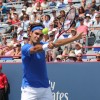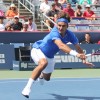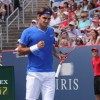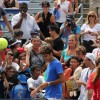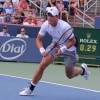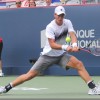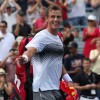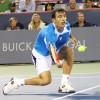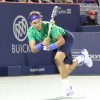By Christopher Lancette
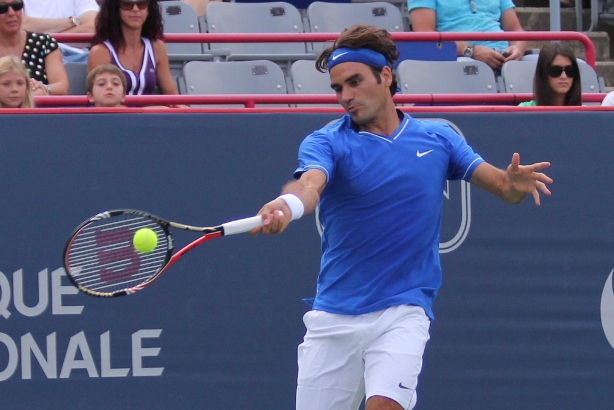 Federer easily dispatched Pospisil on Wednesday. |
MONTREAL – Roger Federer strolled on to center court at Stade Uniprix for his opening Rogers Cup match earlier this week looking every bit like the player I had only seen on TV and the one I was most looking forward to covering here. Could this guy possibly be as suave and debonair in person as he appears on the tube?
Oui!
Federer’s wavy brown hair sat perfectly over his bandana – the style he single-handedly turned into a re-born retail craze. He unzipped his jacket, revealing his Superman-blue shirt that picked up the splash of color in the personal logo emblazoned on his sneaks.
His strokes looked just as smooth, too, even if he started a bit slowly against Vasek Pospisil, a young man who grew up idolizing the Swiss champion. The pop on Federer’s one-handed backhand was there. So was his net game. Watching Federer attack the net reminded me of playing the old Pac-Man arcade game: He dashed forward gobbling up volleys and half volleys and spitting out winners.
The Canadian held his ground – for a while at least. At 5-5 in the first set and down 30-40, Pospisil tried to end a rally prematurely by carving out a drop shot that he cut too deeply. The ball died in the net, as did Pospisil’s chances. The next ten minutes featured a string of nightmares for the 155th-ranked player whose bio is almost completely blank on the ATP Web site. The question of who would win became a fait accompli early in the second set when he somehow managed to hit an overhead straight into the ground while standing at the net.
I wondered if Federer expected his would-be protégé to self-destruct with a silly shot that unleashed an avalanche of errors. I nearly fell out of my chair in the press room when I actually got the chance to ask. Seems that all the rest of the reporters wanted to parlez-vous some frances so English speakers got to go first – all two of us.
“Not really,” he said in response to my question. “I mean, because sure it could happen, but at the same time, I don’t think today you have any players who donate point after point, game after game.”
The always fashion-forward Federer delved into my question more deeply, looking me squarely in the eyes while sporting a navy blue sweat jacket with yellow piping and white accents that gave him the appearance of being adorned with epaulettes.
“I struggled early on with my own returning, which maybe allowed him to get into the match a bit better,” the tennis admiral continued. “He had good variation on his serve. He went through a few games where he couldn’t make very many first serves, then he went through some where he wouldn’t miss one. It’s tricky to know his patterns because I’ve never played him in a match, but maybe just more difficult.”
I wanted to hop in with a follow-up question but knew the newest face in the press room wouldn’t get the chance. Federer was so considerate, however, that he read my mind — offering a response to the question I would have asked about the overhead Pospisil shanked in those ten awful minutes of play.
“Now, should he have been broken in the second set?” Federer asked himself for me. “No. He had the overhead which he could hit in his sleep. For some reason he missed it. I ended up getting lucky and getting the break. It was I think a tough ten minutes. I think this is where I was better than him today. I wasn’t better otherwise. So it was a good match for me to win without playing my very best.”
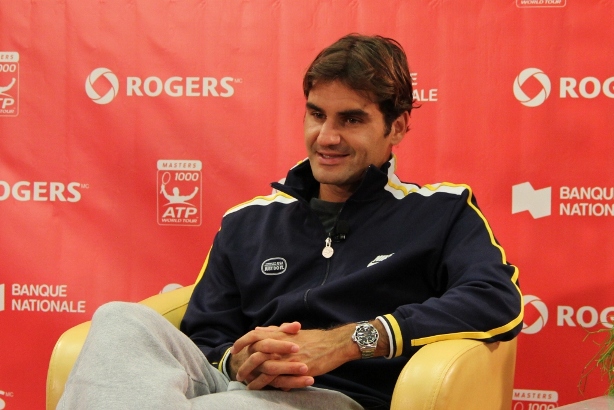 Federer exited early but still regaled press corps. Federer exited early but still regaled press corps. |
French reporters took over the show from there. He dazzled them, too. Roger Federer is so cool that you laugh at the jokes he makes in French – even though you don’t speak French.
Federer fielded a barrage of questions in that language and then moved on to more – in German. When the formal interviews were complete, he continued sitting comfortably – hands folded below the large Rolex watch on his left wrist. He waived them only to accentuate specific points while he maintained simultaneous conversations with two different people, one in French and one in German.
New world No. 1 Novak Djokovic entered the press room later, after a light workout in a 7-5, 6-1 win over Russian Nikolay Davydenko. The press room again packed and Djokovic not likely to start speaking French, I thought I’d have no shot and getting in a question about which he anticipates to be more difficult psychologically – making it to No. 1 or staying there.
Au contraire, mon frère.
I got my shot and tossed my question to him. Djokovic didn’t just answer it: He probed it.
“Well, that’s something that I will see,” he said. “It still has been only four weeks since I’ve become No. 1. This is my first official tournament. I will repeat again: My approach hasn’t changed. I’m really trying to do everything that I have done, even before I become No. 1. Of course, the world is looking at me a bit differently, which I think is obvious to expect.
“But, as I said, you carry a lot of responsibility when you are playing and when you are off the court. You represent not just yourself but the game of tennis in general. You need to handle yourself well. It carries a little bit more weight on your shoulders.
“But, look, you know, it’s a challenge, it’s something I’ve always dreamed of. I don’t want to think about negatives and worry about things that might happen because I have become No. 1: Will I keep it long enough? Will it come to my head? Will I struggle with emotions?
“Look, I’ve become No. 1 of the world. I achieved my dreams. This is all that is going on in my head, all I’m thinking of, just enjoying the moment.”
 Djokovic having fun with teleconference interview from Toronto. |
Djokovic clearly meant what he said about his joie de vivre. At what he thought was the end of the interview, he realized that reporters were watching him from Toronto via a teleconference. They had questions, too.
“Are you kidding me?” he asked aloud, marveling at the connection he was making in that moment because of the modern technology. “This is so cool.” He asked how the folks in Toronto were doing and if it was raining there. He broke the news bulletin that play had been suspended in Montreal. Djokovic happily extended the dual-city interview and waved goodbye to the television when it ended.
The next man up on center court was Rafael Nadal. Yes, the best three players in the game all played on this day and I got face time with all of them. How often does a guy – even a former journalist like myself who now freelances on the side – get to go from the cheap seats to the inner sanctum of the sport he loves?
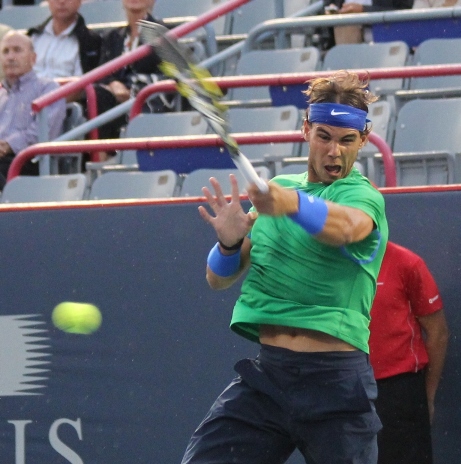 Nadal suffered shocking loss to Dodig. Nadal suffered shocking loss to Dodig. |
The first thing I noticed about Nadal was the distinctive sound made when his racquet strikes the ball. As the sun dropped below top of Stade Uniprix, the whacks he made sounded like a giant lumberjack chopping down a tree. The Paul Bunyan of tennis, he is.
The No. 41-ranked Ivan Dodig didn’t give Nadal quite the first set the previous Croatian on court would have. Overmatched early, he lost 6-1.
I wasn’t sure how I was going to approach the press conference with Nadal. I wanted to learn a little something about him off the court. I was particularly interested in the foundation he set up — Fundacion Rafa Nadal — to help disadvantaged children –– and why it’s so important to him.
I speak Spanish well after having lived in Spain when I was about the age Nadal is now. I worked for a bilingual newspaper in Atlanta afterward and even interviewed Nobel Prize winner Octavio Paz. Still, it has been a while since I spoke Spanish every day and I wasn’t eager to risk a blunder in Rafa’s language in a crowded press room. Would I get the chance to ask a question? Would I be able to do it in Spanish without choking?
Dodig gave me more time to agonize over the issue by coming from behind to swipe the second set. He took the set even after Nadal made one of his famous running forehands in which he curls the ball back into the court from outside the sideline. Who is this guy? There’s not much in Dodig’s bio except that he enjoys music, movies, table tennis and video games.
Better add “defeating Rafael Nadal.”
Unlike Pospisil, who recovered from amnesia and collapsed against Federer, Dodig showed no recall that the man on the other side of the net was once No. 1 in the world. His upset blew the question about the foundation. Nadal’s heart wouldn’t be in it after suffering such an unexpected defeat.
With a chance to complete a day of posing a question to the top three players in the world, I jockeyed for an opportunity. The moderator pointed to me and I dove in, albeit in a different direction. I asked Nadal what his process is for recovering from a loss like this. I posed the question in English so as not to risk slowing him down on a night he was eager to see conclude.
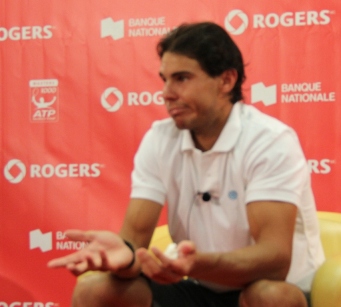 Sting of losing was in Nadal’s voice after Dodig upset. Sting of losing was in Nadal’s voice after Dodig upset. |
“You know, the worst part on a loss like this is all the work that you did, that I did the last week,” he said, the pain of losing clearly audible in his voice.
Nadal elaborated by explaining that he arrived several days early to prepare for the Rogers Cup and that it’s like he has to start the hard work all over after such a loss.
“I will have one day off tomorrow,” he added. “Friday I will be in Cincinnati practicing. I’m gonna try my best. I’m gonna try thinking positive. I’m gonna think what worked well, what didn’t work well, and work on that. I’ll work and be ready to play well in Cincinnati.”
He ambled out of the press room, making way for the night’s final occupant: Ivan Dodig. I asked him how he managed not to repeat Pospisil’s mental collapse against a great player.
“I was working a lot with my coach, especially on the mental part,” Dodig said of his training this year. “I was losing a lot of matches probably thinking a lot. Today we said, for example, if I get some chance, some small chance, I have to be aggressive, I have to try to make point myself, otherwise I cannot beat a guy like Rafa waiting to him to make mistake.”
Though not quite the thrill of interviewing the top three players in the world, it was still an honor to query a man who has just had the best day of his life.
His words, after all, concluded one of the best of mine, too.
Merci beaucoup, Rogers Cup.
Christopher Lancette is a Washington D.C.-area freelance writer. Read his DC Reflections blog and follow him on Twitter @chrislancette.
Photo credit © Won-ok Kim

